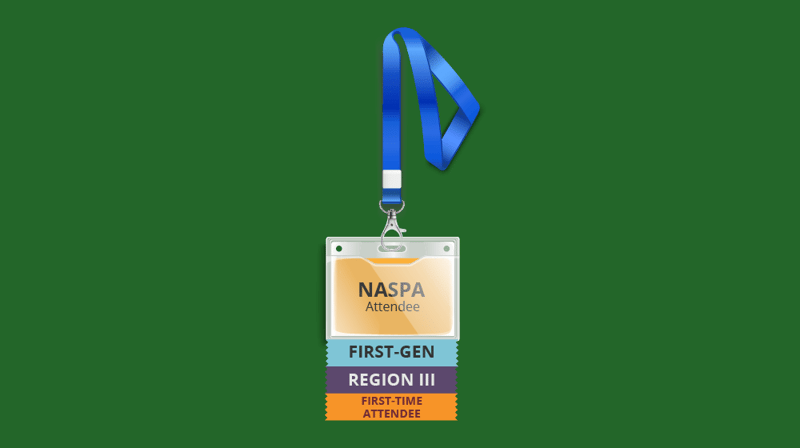Before most aspiring student affairs professionals start their first roles, they envision a clear professional journey for themselves.
You might imagine that after serving as a coordinator for a few years, you’ll become an assistant director, then an associate director, then an executive director — steadily moving up the ladder and job chart within one functional area.
But the journey doesn’t play out that way for many folx. Many people move into roles they never would have anticipated holding — as their skills, interests, and matching opportunities drift towards other areas of higher education or even different fields entirely.
Yet, having a complex, winding journey doesn’t indicate a lack of success or professional happiness. Recently, I hosted a Happy Hour with two awesome women who adore their current roles in higher education, despite them not being within the typical student affairs mold.
Carrie Hawes, associate director of The Center for Corporate Education, and Josyln D. Bell, the special assistant to the senior vice provost — both of Virginia Commonwealth University — discussed the ups, downs, and surprises of their own career journeys… and offered some words of hopeful wisdom to #SApros tuning in.
The full chat is available to download here.
Or, if you’d prefer to just skim through a few of the top lessons Carrie and Joslyn passed on, we’ve got that covered, too. Here are nine standout quotes from our hour together.
9 Key Takeaways
1. What’s a career map?
“A career map is used to kind of zoom out from your current situation and look at your life experience. Identify your career journey, what has happened to you at different points in your life, reflect, make notes about what skills you’ve gained and where you’ve contributed in your role, and maybe things that you haven’t done that you would love to do. Joss and I both made career maps that looked very different and reflect our own kind of styles. There is no right or wrong.” – Carrie Hawes
2. Student affairs journeys are not linear.
“Even if student affairs itself doesn’t open in a traditional way right away for you at an institution you want to be at, think about Carrie and myself — our maps, where else did we work? What were those corporations or other kinds of roles in academic units that might get hired out first? You could still develop your skills that will matter for your student affairs career … we don’t believe that careers are linear.” – Josyln D. Bedell
3. You might discover that a role is simply not the right fit.
“Part of your career journey may be finding that there are things that are not a fit and this [the job at the time] was not a fit for me … I had great mentors who coached me to say, it’s okay to know you made a mistake, that it wasn’t the right time, or it wasn’t the right fit at this point in time and you can pivot.” – Carrie Hawes
4. Mentors can be found in many different places.
“Carrie and I mentioned influential people along the way or folks we met and connected with and built career decisions around. So another map you can design is a mentor map. What are the roles the different people in your life play? … There are so many ways that you have mentors in your life. Some are influencers, some are supporters, some are true mentors. And some are champions … this is a great way to understand all the folks in your life or who you might want to add to your life that [can] help you in these different arenas.” – Josyln D. Bedell
5. Say yes to opportunities (within reason).
“But what I was able to do was take on new projects, stretch my wings, gain skills I wanted to. So, as people left as professionals left or retired, there’d be opportunities. Our bosses would turn to us and say, ‘Well, who wants to learn how to do alternative spring breaks? Who wants to advise student government? Anybody want to learn about a college radio station?’ That was an awesome opportunity that wouldn’t have come along. Cause I wouldn’t have necessarily applied for those jobs … It’s going to be very similar right now, in our field. Through COVID right now, these extra projects are gonna pop up. And while there isn’t financial compensation, you will develop a reputation of being available of being willing to dig in. [But] you have to balance and you have to protect your own mental health and the ability to work well.” – Josyln D. Bedell
6. Being frustrated with the job search is totally normal.
“It’s okay to know that [the job search] may not look what you wanted it to be. But there is time … I know it feels really hard sometimes, and you’ve got to get that first job to get the next job and you can move and you can make more money and you can support yourself. And it’s rough. I will acknowledge that and say that there’s nothing wrong with feeling that way.” – Carrie Hawes
7. It’s okay to have some gaps in your resume.
“My dad had become ill with cancer. And I felt like I wanted to be home and hel[ my mom with his care, spend more time with him intentionally. And I thought if student affairs is a field that I can walk away from, you know, for an undetermined amount of time and come back one day without blinking an eye, that’s the field that I want to be in…. I was very worried about a gap in my resume. Now, 20 plus years later, it’s funny because I’m like that a year is nothing, nothing on a resume. I promise. And that year with my dad was everything.” – Joslyn D. Bedell
8. Interim positions are great testing grounds.
“I had the opportunity to step in as the interim director [of career services]. I did not want to be the director full time and learned a ton about why I didn’t want to lead an office that large … It felt like a professional internship. You know, I got the opportunity to wear the hat, try it out for 12 to 15 months and say no thank you.” – Joslyn D. Bedell
9. Don’t be afraid to leverage your network.
“I would say during this COVID time, this could be really an interesting opportunity. I mean, folks are busy. There’s no doubt about it, but we’re home too, and so we’re not traveling as much. The time between meetings is gone. So it could be that this could be an interesting time to strike up a new connection with somebody you admire or you look up to, or you like how they work and you want to learn more. [I want] to encourage you to think about how to do that, how to take this time to do that.” – Joslyn D. Bedell
Thanks so much for chatting with me, Carrie and Josyln!
And don’t forget: You can still download the full webinar discussion here, and sign up to attend or download future happy hours — featuring #SApros addressing a multitude of challenges and triumphs — here. We hope you’ll join us!






